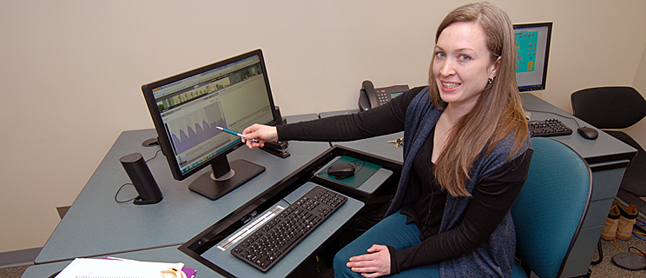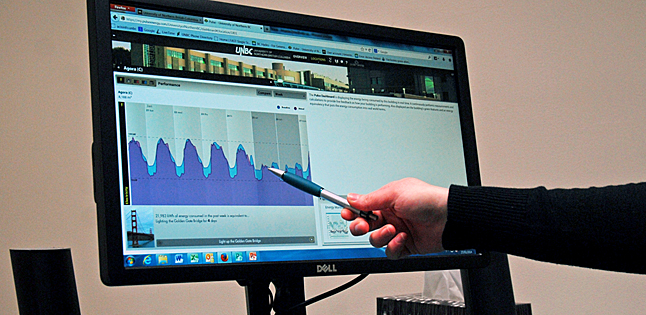UNBC Saving Energy - and Money
Thanks to UNBC’s Energy Management program and incentives from a BC Hydro program designed to curb energy use, the University of Northern British Columbia has realized more than $375,000 worth of energy savings and $145,000 worth of BC Hydro incentives in a little more than three-and-a-half years.

Media Download: UNBC Energy Technician Amanda Drew points out the energy saved thanks to a recent exterior lighting project involving LED lights, which saves UNBC about $6,300 per year.
For much of that time UNBC’s focus centred on lighting retrofits, such as moving from inefficient lighting types, like metal halide bulbs, to LED lights. That focus is switching now from lighting to optimizing buildings.
BC Hydro runs a Continuous Optimization Program, designed to help customers improve their energy efficiency. The program is split into three different phases. The first phase, investigation, was funded by BC Hydro. An energy efficiency expert visited the campus and generated a list of more than $200,000 worth of capital projects that could save UNBC $145,000 a year in electricity and heat.

Media Download: UNBC's energy dashboard allows Ms. Drew to monitor energy uses on the Prince George campus. The savings from the new exterior LED lighting saves the University more than $6,000 per year, and peaks at about $20 a day during the winter. The blue area on the monitor displays the electricity saved per day after the retrofit compared to before. This represents 66,000 kilowatt hours per year - enough to power six houses over the same period.
“These projects will pay for themselves in 1.4 years, which is pretty incredible,” says Amanda Drew, UNBC’s Energy Technician. “We were only required to invest $90,000 under the terms of the program, but since all of the projects have such a quick payback, and we’ll see huge returns, it just makes sense to implement all of them.”
A number of projects were identified and are planned for the coming years:
- Optimizing the heating and ventilation systems of various buildings. Reducing how much air is pumped into a building lowers the energy demand required to heat or cool that excess air. Potential annual savings of $40,000.
- Refining air handling system programs. While weekly schedules are already in place for air handling units, some of the more unique buildings, such as the research labs, can be refined. Potential annual savings of $32,000.
- Adding occupancy sensors. If people are there, the air handler unit or lights will come on. Potential annual savings of $22,000.
- Optimizing water pumping. Reduce the amount of water and glycol pumped to match the demand for water and heat. Potential annual savings of $29,000.
- Improving heat recovery. Heat from lab building exhausts can be captured that would otherwise be exhausted. Potential annual savings of $22,000.
“We were already very efficient. The BC Hydro program is more of a tune-up than anything else,” explains Drew. “A lot of these measures make sense, but we didn’t have the capacity to implement them. That’s where this program helped; it provided resources to investigate how to make our systems even more efficient.”
Part of the reason UNBC is in a position to take advantage of the BC Hydro program is because it set aside $250,000 in an “Energy Conservation Revolving Loan Fund” in 2012 to pay for energy projects. The University uses money from this fund to pay for capital projects with 80% of the realized savings returned to the fund to repay that loan. Once the loan is repaid, those payments drop to 50% for the lifetime of project, growing the fund’s balance.
“We’re not just repaying the loan, we’re investing towards future projects,” says Drew. “And it makes sense to do it. With the rate increases we’re going to see, by 2019 we’d see a 32 per cent increase in electricity costs if we didn’t implement any energy savings projects. With all the projects we have planned, we’re only going to see a seven per cent increase. We’re projected to save $1.3 million on electricity in five years.
“And on the non-financial side, we’re reducing our impact on the environment. There are so many benefits. We’re Canada’s Green University, and this plays out in everything from our teaching and research, to the pumps and air handlers that keep the buildings warm.”